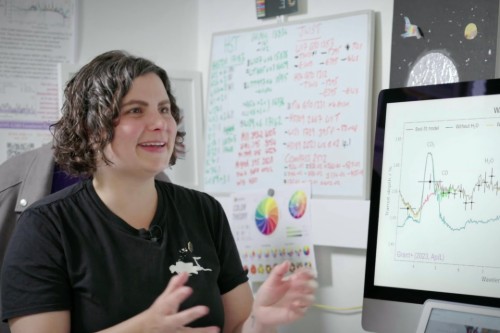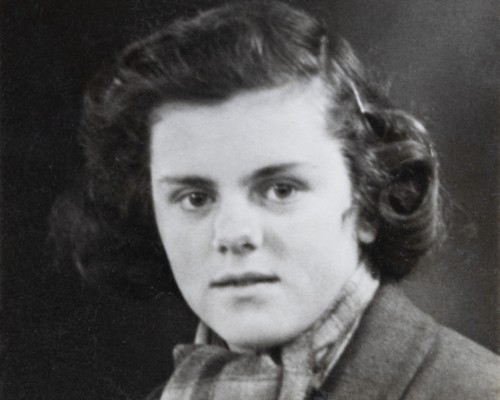She has received The Fowler Award from the Royal Astronomical Society (RAS) for her trailblazing work to advance our understanding of exoplanets – fascinating worlds which exist outside the solar system.
Dr Hannah Wakeford, Associate Professor of Astrophysics at the University’s School of Physics, said: “I am incredibly honoured to receive this award from the Royal Astronomical Society, especially with the strong connections to Bristol and the achievements of women in Physics.
“While this is an individual award, as with all science, nothing would have been possible without a team of amazing people around me and I am forever thankful for the journey they have been on with me.”
The annual prize is for individuals who have made a particularly noteworthy contribution to Astronomy, including emerging areas, within 10 years of completing their PhD. It is one of two awards – the other is in Geophysics – created in 2004 thanks to Rosemary Fowler, in memory of her husband Prof Peter Fowler and his father Prof Ralph Fowler, two highly distinguished RAS Fellows.
Rosemary’s own remarkable academic endeavours as a research student at the University in 1948 ultimately changed our understanding of physics. Her discovery of the Kaon, aged 22, helped lead to a revolution in the theory of particle physics. And it continues to be proven correct: predicting particles such as the Higgs boson, discovered at CERN, the European Organisation for Nuclear Research, in Geneva more than half a century later.
In 1949, Rosemary (née Brown) left the University, having published her revolutionary discovery in three ‘Brown et al.’ research papers including two in Nature, and married fellow physicist Peter. Bristol’s globally-renowned cosmic ray physics team, led by Professor Cecil Powell, were hunting for new fundamental particles and such breakthroughs resulted in Powel being awarded the Nobel Prize in 1950. Rosemary was one of the first women to be awarded a First in Physics at the University and last summer, aged 98, she was made an honorary Doctor of Science by her alma mater.
Dr Fowler said: “I am delighted that the Royal Astronomical Society has highlighted the importance of Dr Wakeford’s research with a Fowler Award and especially that she is a Bristol physicist, as I was."
Dr Wakeford’s love of science began as a child.
“I have always wanted to be an explorer; science gave me the freedom to discover new things and ways of doing something. Exoplanets were always a dream of science fiction for me, being able to turn them into science fact and learn about the interconnectedness of science from physics to chemistry, and geology,” she said.
“Nature’s imagination is far greater than our own and it is amazing to be on the forefront of those revelations.”
Now aged 35, Dr Wakeford is already a world-leading expert on the composition of exoplanet atmospheres, with a particular emphasis on the properties and composition of clouds in the atmospheres of hot Jupiter-type exoplanets.
Using observational data from the Hubble and JWST – the largest telescope in space – backed up by sound theoretical understanding and data analysis techniques, Dr Wakeford has published a number of influential academic papers detailing spectral analysis of transiting exoplanet atmospheres and their clouds.
“Exoplanet science is an ever-expanding field of discovery, and I have been lucky enough to work with state-of-the-art telescopes at the beginning of our efforts to learn more about these incredible planets’ atmospheres,” she said.
“There is nothing more rewarding than being able to share my awe of these worlds and their exotic nature with others.”
Dr Wakeford is among 22 award winners announced at the RAS A&G Highlights Meeting on Friday 10 January. Each year the RAS recognises significant achievement in the fields of astronomy and geophysics through a number of awards, medals and prizes, encompassing different types of talent from research to education and outreach. Awards are designated 'A' for astronomy, including astrophysics and cosmology, and 'G' for geophysics encompassing solar physics, planetary science and solar-terrestrial physics.
Professor Jennifer McManus, Head of the School of Physics at the University of Bristol, said: ““Congratulations to Hannah on this well-deserved award. Her research continues to grow from strength to strength and I’m delighted to see her hard work acknowledged in this way. The award is all the more significant given the links between Bristol Physics and Rosemary Fowler whose generosity led to the establishment of the award.”
Bristol was one of the first universities to admit women on an equal basis to men. Today women make up more than half of its workforce and many of its senior team, including now its Vice-Chancellor and President – a first for the University.
Professor Evelyn Welch, Vice-Chancellor and President at the University of Bristol, said: “Many congratulations to Dr Wakeford on achieving this prestigious accolade which has a very special link to the University and bears testimony to an impressive, growing legacy of Bristol female physicists.
“It’s truly heartening that this award has come full circle. I hope it will help inspire female scientists to keep reaching new heights and make future important breakthroughs, which advance our understanding of the entire universe in such remarkable ways.”
Dr Wakeford will be presented with her award at the RAS National Astronomy Meeting in July.
Professor Mike Lockwood, President of the RAS, added: “It gives me great pleasure to see so many talented individuals being rewarded for their hard work, dedication and immense contributions to the fields of astronomy and geophysics. All our award winners are an inspiration and it is clear to me that the depth of talent means that the future of our sciences is incredibly bright.”


